|
|
|
Sort Order |
|
|
|
Items / Page
|
|
|
|
|
|
|
| Srl | Item |
| 1 |
ID:
017916
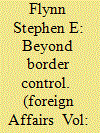

|
|
|
|
|
| Publication |
Nov-Dec 2000.
|
| Description |
57-68
|
|
|
|
|
|
|
|
|
|
|
|
|
|
|
|
| 2 |
ID:
186201
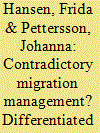

|
|
|
|
|
| Summary/Abstract |
While the construction of migration as a security threat in Europe has been thoroughly examined, how different groups of migrants become targets of security concerns has not received similar attention. In its fight against irregular immigration, the European Union uses visa liberalisation agreements with neighbouring states as an incentive for cooperation on migration control. At a first glance, this strategy appears somewhat contradictory, as visa liberalisation potentially increases the share of visa overstayers among irregular migrants. Through analysis of the annual “Risk Analysis” reports between 2015 and 2020 published by EU’s border and migration management agency, FRONTEX, this article shows that visa overstay is routinely left out of the agency’s security concerns of irregular migration, thus rendering risk assessments asymmetrically occupied with irregular migration by means of “illegal entry”. Although visa overstayers are not conceptualised as threats to security in discourse on par with other categories of irregular migrants, we find that they are increasingly subjected to a rationale of surveillance and risk.
|
|
|
|
|
|
|
|
|
|
|
|
|
|
|
|
| 3 |
ID:
132321
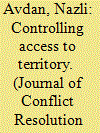

|
|
|
|
|
| Publication |
2014.
|
| Summary/Abstract |
Previous scholarship has largely failed to address the effect of economic interdependence on issue areas other than interstate conflict. This study seeks to redress this lacuna by focusing on states' visa policies and examining the impact of trade and capital interdependence in the context of transnational terrorism. The article argues that economic ties affect visa policies through a reconfiguration of preferences and the opportunity costs of economic loss and by tempering the impact of terrorism. To support this claim, the study conducts statistical analysis using directed dyad data on the visa policies of 207 states and independent political units. The article shows that the impact of economic interdependence is contingent on whether states are directly targeted in attacks of terrorism or face indirect threats from global terror. The study finds that economic incentives overwhelm security concerns when threats are indirect but have relatively limited influence, given threats against a state's own citizens or territory.
|
|
|
|
|
|
|
|
|
|
|
|
|
|
|
|
| 4 |
ID:
166677
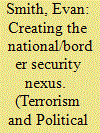

|
|
|
|
|
| Summary/Abstract |
This article looks at an earlier episode in the history of the UK border security apparatus by examining how the immigration control system was used in the 1970s and 1980s to detect potential terrorists from the Middle East and North Africa. Using recently opened archival records, it shows that the UK government introduced a strict system of visa checks, interviews, and other measures to nearly all Middle Eastern and North African visitors to the UK to prevent the entry of suspected terrorist personnel. By using these highly arbitrary measures, it became the modus operandi of the UK authorities to treat all Middle Eastern and North Africans as potential terrorists until convinced otherwise.
|
|
|
|
|
|
|
|
|
|
|
|
|
|
|
|
| 5 |
ID:
109845
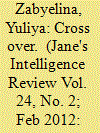

|
|
|
| 6 |
ID:
104010
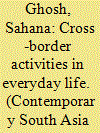

|
|
|
|
|
| Publication |
2011.
|
| Summary/Abstract |
This paper will address the multiple forms and layers of porosity that give borderlands, such as the Bengal borderland, their distinctive nature as zones of contestation. Cross-border interactions continue to be an integral feature of everyday life in the Bengal borderland despite increasing militarisation and regulation by the Indian government in the last decade. Criminalization of local cross-border flows has driven them underground - while organized cross-border crimes (smuggling and trafficking) enjoy considerable attention, the breadth and depth of informal cross-border interactions in the quotidian lives of borderlanders remain understudied. What is the significance of such daily cross-border transactions? How do they feed into the local perceptions of the state policies of border control? How do they relate to larger organized flows of smuggling and trafficking? Drawing upon ethnographic fieldwork in the border district of North 24 Parganas in West Bengal, India, this paper critically examines the rationales and practices of such informal 'illegal' cross-border interactions and problematizes the territorial logic of the postcolonial nation-state as it is contested in the realities of the borderland. Such a focus also enables a construction of the social history of those people in whose worlds an international border appeared in the monsoon of 1947, thus relating the present configurations of porosity to the regional unity that existed in the pre-Partition past.
|
|
|
|
|
|
|
|
|
|
|
|
|
|
|
|
| 7 |
ID:
144245
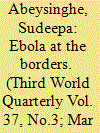

|
|
|
|
|
| Summary/Abstract |
As well as a site of politics and public health action, the outbreak of Ebola in West Africa has been a focus of media representations. This paper examines print media narratives around border control in relation to Ebola in the UK, the USA and Australia from the start of the epidemic to May 2015. It shows that Ebola became mobilised as a frame through which domestic politics could be discussed. The disease was transformed from a problem for West Africa to a problem for the West. The context of West Africa and affected populations was homogenised and hidden. The focus of reporting centred upon domestic political actions and more local sources of threat.
|
|
|
|
|
|
|
|
|
|
|
|
|
|
|
|
| 8 |
ID:
108146
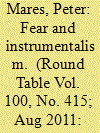

|
|
|
|
|
| Publication |
2011.
|
| Summary/Abstract |
Immigration and border protection policies are driven by national interest. However, the national interest can be more broadly and more narrowly conceived, depending in part on the degree to which the future of the individual state is understood to be contingent on a shared global future and on the recognition that the short-term costs of international cooperation may bring long-term collective benefits. Whereas such global interdependence is recognised in international statecraft in the domains of aid, trade and climate change, such recognition does not extend to immigration. Australia's national policies towards human movement from the Global South tend to be driven in large part by exaggerated fears (of unregulated border crossings) or a narrowly instrumental approach to the economic benefits of human capital transfers (migrants filling skills gaps and providing flexibility in the labour market). A broader conception of migration would take into account the potential developmental benefits of human movement for source nations and for migrants themselves.
|
|
|
|
|
|
|
|
|
|
|
|
|
|
|
|
| 9 |
ID:
168609
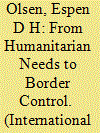

|
|
|
|
|
| Summary/Abstract |
Migration is a topic that has frequently been present in political debates and the mass media in recent years, especially following the European and EU migration and refugee crisis. Newspaper debates in Norway presented different narratives with different conceptions of global justice. Migration is by definition a cross-border issue that has a direct effect on the interests of states as well as individuals, therefore the question of global justice is highly relevant. Three core media narratives were present: the humanitarian, the statist, and the EU integration narrative, which particularly highlights Norway as an integrated non-member of the EU. In the humanitarian narrative, a notion of impartiality of universal individual rights was prevalent, while in the statist narrative and to some extent in the EU integration narrative, a territorial and state-oriented conception of justice as non-domination was visible. Concerns about human rights were prevalent mainly in matters far away from Norway, but less so when the so-called migration crisis hit Norway directly.
|
|
|
|
|
|
|
|
|
|
|
|
|
|
|
|
| 10 |
ID:
162414
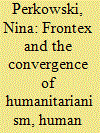

|
|
|
|
|
| Summary/Abstract |
While there has been growing scholarly interest in the convergence of humanitarianism and security in contemporary EUropean border governance, much of the existing literature has neglected the role of human rights in this process. Drawing on in-depth interviews with Frontex officials, this article takes the simultaneous portrayal of the agency as rescuer of migrants at sea, promoter of fundamental rights and defender of EUropean citizens against migrant threats as a starting point to rethink the relationship of humanitarianism, human rights and security in the governing of EUropean borders. Conceptualizing them as discourses of protection that render their subjects vulnerable in various ways, the article contributes to a deeper understanding of the connections and combined effects of humanitarianism, human rights and security in EUropean border governance. Finally, it shows that Frontex’s positioning in humanitarian, human rights and security terms has strengthened the agency in three ways. First, it has allowed Frontex to cooperate with a range of actors in ‘managing’ EUropean borders. Second, it has enabled the agency to become a ‘go-to’ solution to diverse crises in border governance. Third, it has allowed Frontex officials to shift blame for human rights abuses to member-states.
|
|
|
|
|
|
|
|
|
|
|
|
|
|
|
|
| 11 |
ID:
143309
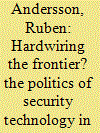

|
|
|
|
|
| Summary/Abstract |
Migration controls at the external EU borders have become a large field of political and financial investment in recent years – indeed, an ‘industry’ of sorts – yet conflicts between states and border agencies still mar attempts at cooperation. This article takes a close look at one way in which officials try to overcome such conflicts: through technology. In West Africa, the secure ‘Seahorse’ network hardwires border cooperation into a satellite system connecting African and European forces. In Spain’s North African enclaves of Ceuta and Melilla, advanced border fencing has joined up actors around a supposedly impenetrable divide. And on the EU level, the ‘European external border surveillance system’, or Eurosur, papers over power struggles between agencies and states through ‘decentralized’ information-sharing – even as the system’s physical features (nodes, coordination centres, interfaces) deepen competition between them. The article shows how such technologies, rather than ‘halting migration’, have above all acted as catalysts for new social relations among disparate sectors, creating areas for collaboration and competition, compliance and conflict. With these dynamics in mind, the conclusion sketches an ‘ecological’ perspective on the materialities of border control – infrastructure, interfaces, vehicles – while calling for more research on their contradictory and often counterproductive consequences.
|
|
|
|
|
|
|
|
|
|
|
|
|
|
|
|
| 12 |
ID:
111839
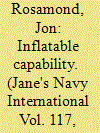

|
|
|
| 13 |
ID:
132335
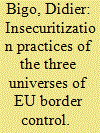

|
|
|
|
|
| Publication |
2014.
|
| Summary/Abstract |
What practices of (in)securitization involve the notions of border and border control in the European Union? How do these practices operate? How are they assembled? In the resulting assemblage, is the notion of borders - understood as state borders - still relevant for the control of individuals and populations moving across the frontiers of the EU? Drawing on empirical observations and with a specific focus on how border control is translated into different social universes, this article seeks to show that practices of control are routinely embedded in a practical sense that informs what controlling borders does and means. This practical sense is itself informed by different professional habitus and work routines involving deterrence and the use of force, interrogation and detention, surveillance of populations on the move and the profiling of (un)trusted travellers. Its strength varies in relation to its shared dimension by most of the operators, and is adjusted to the materiality of borders as well as to the local contexts in which it is deployed. It activates, or does not activate, the maximal use of various control technologies (satellites, pre-registration and interoperable exchange of data between the state and private bureaucracies, biometrics identifiers, body-scanners). For understanding practices of (in)securitization, actual work routines and the specific professional 'dispositions' are therefore more important than any discourses actors may use to justify their activities.
|
|
|
|
|
|
|
|
|
|
|
|
|
|
|
|
| 14 |
ID:
170998
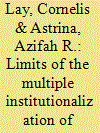

|
|
|
|
|
| Summary/Abstract |
This article explores the limits of the multiple institutionalization of border control within the context of the Singapore-Johor-Riau Islands (SIJORI) interregional border, providing a detailed examination of three border control institutions, i.e. immigration, customs, and the Indonesian Maritime Security Agency (BAKAMLA: Badan Keamanan Laut Republik Indonesia) in Batam, Riau Islands Province, Indonesia. This article asks why, in a region with high institutional density and rapid economic growth, illicit practices remain omnipresent, and finds that this stems from incompatible border institution design and overemphasis on individual organizational interests. We find that individual institutions' tendencies to focus on their own goals compromises the common goal of security that justifies their presence. This has been exacerbated by the historical legacy of sectoral egotism that continues to divide Indonesia's public institutions.
|
|
|
|
|
|
|
|
|
|
|
|
|
|
|
|
| 15 |
ID:
067321
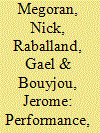

|
|
|
| 16 |
ID:
139494
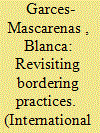

|
|
|
|
|
| Summary/Abstract |
Through a detailed case study of immigration policies in Malaysia, this article examines processes of bordering in a country where physical borders do not seem to play a pivotal role. It describes how, in Malaysia, immigration policies neither focus on border control nor pose strict limits on immigrants’ entry but rather seek to curtail immigrants’ presence once in the country. The analysis of this “securitization from within” allows us to make three interconnected arguments. First, no border control does not mean no immigration control. Second, confines or internal borders play a decisive role in the construction and preservation of a cheap, flexible labor force. However, despite the disproportionate power of the Malaysian executive, these confines are systematically challenged by immigrants’ everyday practices either by resorting to illegality or by reentering the country after deportation. Thus, when the contours of legality are very narrow, illegality does not necessarily mean a more subordinated form of existence but rather a way to resist state control. Third, both foreigners and citizens can be deprived of their most basic rights. In this regard, the conventional wisdom that citizenship draws a clearly defined line of exclusion/inclusion proves to be wrong in the case of Malaysia.
|
|
|
|
|
|
|
|
|
|
|
|
|
|
|
|
| 17 |
ID:
168494
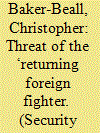

|
|
|
|
|
| Summary/Abstract |
This article analyses the European Union’s response to the threat of the ‘returning foreign fighter’ (referred to with increasing frequency as the ‘foreign terrorist fighter’), arguing that it has been characterized by a move to (re)frame migration and border control as essential aspects of EU counter-terrorism policy. The article offers three important observations on the significance of this move. First, it critiques the way in which the EU’s response to this problem is based upon and reinforces a narrow understanding of returning foreign fighters. Second, it argues that the EU has invoked the threat from returning foreign fighters not with the sole intention of preventing terrorism but rather as part of the ongoing securitization of migration and the EU border. Third, it suggests that the threat from returning foreign fighters has been invoked as a way of further legitimizing the EU’s emerging role as a security actor and its embrace of preemptive security practice. The article argues throughout that the move to construct the returning foreign fighter issue in this way has important political and social implications for all categories of migrant, with migrant populations now deemed a potential source of terrorist threat.
|
|
|
|
|
|
|
|
|
|
|
|
|
|
|
|
|
|
|
|
|